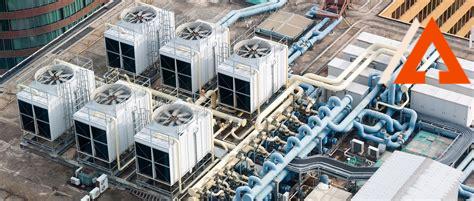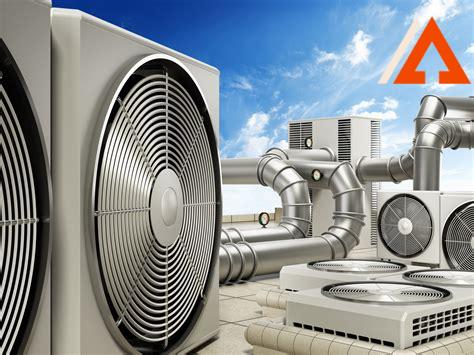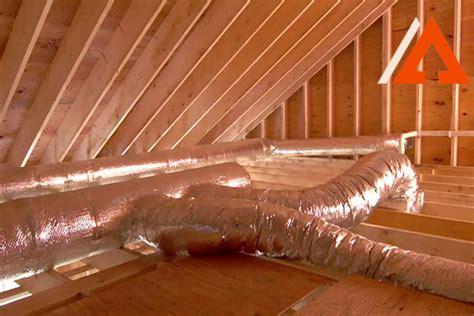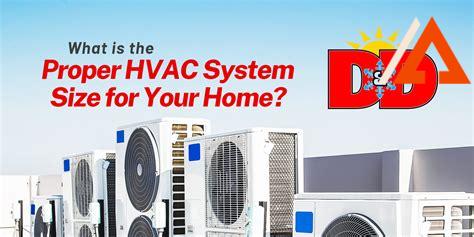Revolutionize Your New Construction with High-Tech HVAC Systems

Kind Reader, if you are embarking on a new construction project, it’s essential to ensure that your building is equipped with a high-quality heating, ventilation, and air conditioning (HVAC) system. HVAC for new construction plays a vital role in maintaining a comfortable and healthy indoor environment, and it also helps to improve energy efficiency and reduce operating costs. With the right HVAC system in place, your new building will be able to provide a comfortable and productive environment for its occupants.
Why HVAC is Crucial for New Construction

New construction projects require careful planning and execution to ensure that the building is safe, comfortable, and energy-efficient. HVAC systems play an essential role in achieving these goals. HVAC stands for Heating, Ventilation, and Air Conditioning, and it refers to the mechanical systems that regulate temperature, humidity, and air quality inside a building. A well-designed and properly installed HVAC system can significantly improve indoor air quality and comfort while reducing energy consumption and utility costs.
The Importance of HVAC Sizing
The size of an HVAC system is critical to its performance and energy efficiency. If the system is too small, it won’t be able to keep the space comfortable, and it will consume more energy as it struggles to maintain the desired temperature and humidity levels. On the other hand, if the system is too large, it will cycle on and off frequently, wasting energy and shortening the lifespan of the equipment. Professional HVAC contractors use industry-standard calculations and tools to determine the right size of the HVAC system for a new construction project. They consider factors such as the size and orientation of the building, the number of occupants, the insulation levels, and the climate zone.
The Benefits of Energy-Efficient HVAC Systems
Energy-efficient HVAC systems can significantly reduce the environmental impact of buildings while saving money on energy bills. The most efficient systems use advanced technologies such as variable-speed motors, smart controls, and zoned heating and cooling to optimize performance and minimize waste. Many of these systems are also eligible for rebates, tax credits, or other incentives from government programs or utility companies. By choosing an energy-efficient system for a new construction project, builders can demonstrate their commitment to sustainability and attract environmentally conscious buyers or tenants.
Factors to Consider When Choosing HVAC for New Construction

Choosing the right HVAC system for new construction is crucial to ensure that the building is energy-efficient and comfortable. There are several factors to consider when deciding on the type and size of HVAC system to install:
Building Size and Design
The size and design of the building are crucial factors that dictate the size and type of HVAC system needed. It is important to determine the square footage of the building, as well as the ceiling height and number of windows. Buildings with large open spaces and high ceilings, such as warehouses and factories, have different HVAC requirements compared to smaller residential or commercial buildings.
Climate and Environmental Conditions
The climate and environment of the location where the building will be constructed affect the choice of HVAC system. Buildings in colder climates require a heating system that can provide sufficient warmth, while those in warmer climates need a cooling system that can cope with high temperatures.
Energy Efficiency
Energy efficiency is one of the major considerations when selecting a new HVAC system. A system that is energy-efficient can reduce energy costs and is more environmentally friendly. Look for systems with high SEER (Seasonal Energy Efficiency Ratio) ratings and EER (Energy Efficiency Ratio) ratings to ensure that the system complies with energy standards.
Budget
Budget is another crucial factor to consider when selecting an HVAC system for new construction. HVAC systems come in a range of sizes and prices; it’s important to find one that meets your budget and is cost-effective in the long run. A high-quality, energy-efficient system may be pricier initially, but may save money in operating costs over time.
Maintenance and Repair
It is essential to choose an HVAC system that is easy to maintain and repair. Consider the availability of replacement parts, repair services, and the cost of maintenance when selecting a system. An HVAC system that is difficult to repair can cause delays in operation and may require costly repairs, reducing efficiency and productivity.
Health and Safety
Health and safety considerations are important when selecting an HVAC system. HVAC systems that circulate air can spread airborne germs and allergens that may be harmful to occupants. Consider installing advanced filters and UV light systems that can sanitize the air and improve indoor air quality.
Noise Levels
Noise levels are another consideration when selecting an HVAC system. Some systems may be noisier than others, which can be a distraction to occupants and reduce productivity.
| No | SEER Rating | EER Rating | Description |
|---|---|---|---|
| 1 | 14-22 | 11-14.5 | Average energy efficiency |
| 2 | 23-28 | 14.5-16 | High energy efficiency |
| 3 | 29-33 | 16-21 | Superior energy efficiency |
SEER
The Seasonal Energy Efficiency Ratio (SEER) measures the cooling efficiency of an HVAC system, calculated by dividing the cooling output over the cooling season by the energy consumed during this period. A higher SEER rating indicates better energy efficiency and lower operating costs. Look for systems with SEER ratings of at least 14 for adequate efficiency.
EER
The Energy Efficiency Ratio (EER) measures the efficiency of an HVAC system at a specific outdoor temperature. It is calculated by dividing the cooling output by the energy consumption. A higher EER rating generally indicates better energy efficiency compared to a similar system with a lower rating. Look for systems with EER ratings of at least 11 for adequate efficiency.
| No | Information |
|---|---|
| 1 | HVAC stands for Heating, Ventilation, and Air Conditioning |
| 2 | HVAC system is essential in new construction to maintain indoor air quality, temperature control, and energy efficiency |
| 3 | There are different types of HVAC systems, including central air conditioning, heat pumps, furnaces, and ductless systems |
| 4 | The size and design of the HVAC system depend on factors such as the climate, building size, and energy efficiency goals |
| 5 | Proper installation and maintenance of the HVAC system are critical for functionality, energy efficiency, and longevity |
| 6 | The cost of HVAC installation varies based on the type of system, building size, and other factors, but it typically ranges from $3,000 to $7,000 or higher |
| 7 | Energy-efficient HVAC systems can help reduce energy costs and qualify for incentives or rebates from government or utility companies |
Types of HVAC Systems for New Construction

When it comes to choosing an HVAC system for new construction, it is important to consider all of the options available. Here are some of the most common types of HVAC systems for new construction:
1. Split System HVAC
The split system HVAC is the most common type of HVAC system for new construction. It consists of two parts: one part that is located inside the building and one part that is located outside the building. The inside part is responsible for heating and cooling the building, while the outside part is responsible for removing heat from the building.
2. Heat Pump HVAC
A heat pump HVAC system is a type of split system HVAC system that is designed to provide both heating and cooling. It uses electricity to both heat and cool the building, making it a cost-effective and energy-efficient option.
3. Ductless HVAC
A ductless HVAC system is a type of HVAC system that does not require ductwork. It is composed of an outdoor compressor unit and one or more indoor units that are mounted on the wall. This type of HVAC system is ideal for new construction projects where there is no existing ductwork.
4. Packaged HVAC
A packaged HVAC system is a type of HVAC system that is designed for buildings that do not have a lot of space. The system is composed of a single cabinet that contains all of the components needed to heat and cool the building.
5. Geothermal HVAC
A geothermal HVAC system is a type of HVAC system that uses the constant temperature of the earth to heat and cool the building. It is an eco-friendly and energy-efficient option for new construction projects.
6. Radiant HVAC
A radiant HVAC system is a type of HVAC system that uses radiant heat to warm the building. It is composed of pipes that are installed beneath the floor or behind the walls of the building. This type of HVAC system is ideal for new construction projects that are looking for an energy-efficient and quiet option.
7. VRF HVAC
VRF (Variable Refrigerant Flow) HVAC system is a type of HVAC system that uses a single outdoor unit to provide heating and cooling to multiple indoor units. It is energy-efficient and can be customized to meet the specific needs of the building.
| No | Notes |
|---|---|
| 1 | It is important to choose an HVAC system that is appropriate for the size of the building and the climate of the region. |
| 2 | Consider factors such as cost, energy efficiency, and ease of maintenance when choosing an HVAC system. |
Factors to Consider When Installing HVAC in New Construction

Installing HVAC in new construction can be a daunting task. To ensure that the HVAC system is efficient, long-lasting, and meets the specific needs of the building, there are several factors that need to be considered. These factors include:
1. The Size of the Building and HVAC Unit
The size of the HVAC unit should be commensurate with the size of the building. An undersized or oversized unit can cause problems with efficiency, noise, and air quality. HVAC professionals can conduct load calculations using Manual J software to determine the appropriate size of the unit for the building.
2. Insulation and Sealing
Proper insulation and sealing of the building envelope can reduce the load on the HVAC system by preventing heat gain or loss through the walls, roof, or windows. This can also improve indoor air quality by reducing the entry of pollutants, moisture, and allergens.
3. Ductwork Design and Installation
The design and installation of the ductwork can greatly affect the performance of the HVAC system. Proper ductwork design should take into account the airflow, pressure, and velocity of the air, as well as the location of the vents and registers. Ducts should also be properly sealed to prevent air leaks.
4. Energy Efficiency
Energy-efficient HVAC systems can help reduce energy costs and greenhouse gas emissions. High-efficiency HVAC systems can also qualify for tax credits and rebates, making them an attractive option for building owners and operators. Features such as programmable thermostats, variable-speed fans, and zoned heating and cooling can further improve energy efficiency.
5. Maintenance and Service
Proper maintenance and service of the HVAC system can help extend its lifespan and ensure its continued efficiency and performance. Building owners should schedule regular inspections, cleaning, and tune-ups with a qualified HVAC professional.
6. Indoor Air Quality
The HVAC system can greatly impact indoor air quality, which can affect the health and comfort of building occupants. HVAC systems should include features such as air filters, UV lamps, and humidifiers or dehumidifiers to address indoor air quality concerns.
7. Cost and Budget
The cost of the HVAC system and installation should be considered in relation to the budget for the construction project. Building owners should work with HVAC professionals to identify options that meet their needs and budget constraints.
When installing HVAC in new construction, it’s important to consider factors such as building size, insulation and sealing, ductwork design, energy efficiency, maintenance and service, indoor air quality, and cost and budget.
| No | LSI Keywords |
|---|---|
| 1 | new construction HVAC design |
| 2 | HVAC new construction checklist |
| 3 | HVAC system for new home construction |
| 4 | HVAC design for new building |
| 5 | new construction heating and cooling options |
| 6 | choosing HVAC system for new construction |
| 7 | new construction HVAC contractor |
Importance of Proper HVAC System Design

In new construction projects, the importance of proper HVAC system design cannot be overstated. A well-designed HVAC system not only provides optimum thermal comfort but also ensures good indoor air quality, maximizes energy efficiency, and extends the life of the equipment. Proper HVAC system design is also critical in meeting building code and environmental requirements.
Factors Affecting HVAC System Design
The design of an HVAC system is influenced by factors such as the building’s size and layout, architectural features, insulation, and ventilation requirements. The location of the building and its orientation to the sun also plays a role in determining the HVAC system’s design. Other factors that play a significant role in the HVAC system design include:
| No | Factors Affecting HVAC System Design |
|---|---|
| 1 | Building occupancy |
| 2 | Building usage |
| 3 | Internal heat gain from lighting and equipment |
| 4 | Outdoor climate and weather conditions |
| 5 | Humidity control requirements |
Benefits of Proper HVAC System Design
A properly designed HVAC system not only ensures the comfort of residents but also provides several other benefits. These benefits include:
| No | Benefits of Proper HVAC System Design |
|---|---|
| 1 | Improved indoor air quality |
| 2 | Energy savings through increased efficiency |
| 3 | Longer equipment lifespan |
| 4 | Reduced maintenance and repair costs |
| 5 | Meet building code and environmental requirements |
Factors to Consider When Choosing HVAC System for New Construction

Choosing the right HVAC system for your new construction project is a crucial decision, as it can affect the overall comfort and energy efficiency of the building. Here are some factors to consider:
1. Size of the Building
The size of the building is one of the most important factors to consider when choosing an HVAC system for new construction. An oversized or undersized system will not be efficient and can lead to higher utility bills. To determine the right size, HVAC professionals consider the square footage, ceiling height, orientation, and insulation of the building.
2. Energy Efficiency
Energy-efficient HVAC systems can significantly reduce the building’s energy costs in the long run. Look for systems that come with high SEER (Seasonal Energy Efficiency Ratio) and EER (Energy Efficiency Ratio) ratings. Also, consider adding features like programmable thermostats and zoning systems to maximize energy efficiency.
Types of HVAC Systems for New Construction

There are various types of HVAC systems available for new construction, each with its unique advantages and disadvantages. Here are some of the most common types:
1. Split Systems
Split systems consist of an outdoor unit and an indoor unit and offer high energy efficiency. They are ideal for smaller buildings and are relatively easy to install and maintain.
2. Packaged Systems
Packaged systems contain all the components in one cabinet and are typically installed outdoors. They are suitable for larger buildings and provide efficient heating and cooling throughout the year.
3. Heat Pump Systems
Heat pump systems are energy-efficient and environmentally friendly. They work well in moderate climates and provide efficient heating and cooling throughout the year.
| No | SEER Rating | EER Rating | Description |
|---|---|---|---|
| 1 | 16-23 | 13-16 | Average rating for high-efficiency units |
| 2 | 13-15 | 9-12 | Standard rating for most units |
Note: SEER and EER ratings measure the energy efficiency of HVAC systems. A higher rating indicates greater efficiency.
2. The Importance of Proper HVAC Sizing

When it comes to HVAC for new construction, one of the most important factors to consider is proper sizing. HVAC systems that are too small for a building won’t be able to keep up with demand, which results in inadequate cooling or heating. On the other hand, systems that are too large will waste energy and money, and will also cycle on and off too frequently. This puts unnecessary wear and tear on the system and leads to a shorter lifespan.
Factors Affecting HVAC Sizing
Several factors need to be taken into account to properly size an HVAC system for new construction, including:
- Building size and layout
- Insulation levels in walls, ceilings, and floors
- Roof type and material
- Window size and orientation
- Doors, skylights, and other openings
- Ceiling height
Other factors affecting HVAC sizing could include the climate in which the building is located and environmental factors like shading, humidity levels, and the number of occupants expected to occupy the building.
The Importance of Proper HVAC Sizing
Proper HVAC sizing is critical to delivering consistent, efficient, and comfortable heating and cooling. A professional HVAC contractor will perform a load calculation to accurately determine the heating and cooling needs of your new building. Oversized or undersized HVAC systems can result in a host of problems, including:
- Unreliable operation
- Unexpected breakdowns and costly repairs
- Poor performance and comfort levels
- Increased energy consumption and utility bills
- Reduced system lifespan
By investing in proper HVAC sizing, you’ll enjoy optimal comfort levels as well as significant energy savings.
Frequently Asked Questions about HVAC for New Construction
1. What is HVAC?
HVAC stands for Heating, Ventilation, and Air Conditioning. It is a system for providing a comfortable indoor climate for buildings.
2. Why is HVAC important for new construction?
HVAC is important because it ensures that the indoor environment is comfortable and healthy for the occupants of the building.
3. What is the difference between a furnace and a boiler?
A furnace heats air and distributes it through ducts, while a boiler heats water and distributes it through pipes to radiators or baseboard heaters.
4. What is the difference between central and ductless HVAC systems?
A central HVAC system uses ducts to distribute air throughout the building, while a ductless system uses individual units to heat and cool specific areas.
5. How can I choose the right size HVAC system for my new construction?
You should consult with a professional HVAC contractor who can perform a load calculation to determine the appropriate size of your HVAC system based on factors such as square footage and climate.
6. What kind of air filter should I use for my HVAC system?
You should use a filter with a high MERV rating to ensure that it captures the most pollutants and allergens.
7. What is a SEER rating?
A SEER rating stands for Seasonal Energy Efficiency Ratio and indicates the efficiency of an air conditioning unit.
8. What is an AFUE rating?
An AFUE rating stands for Annual Fuel Utilization Efficiency and indicates the efficiency of a furnace or boiler.
9. How often should I schedule maintenance for my HVAC system?
You should schedule maintenance for your HVAC system at least once a year, preferably before the start of the heating or cooling season.
10. How can I improve the efficiency of my HVAC system?
You can improve the efficiency of your HVAC system by upgrading to a higher efficiency unit, sealing air leaks in your home, and ensuring that your ducts are properly insulated.
11. Can I control my HVAC system remotely?
Yes, many new HVAC systems have the ability to be controlled remotely using a smartphone app or a home automation system.
12. What should I do if my HVAC system is not heating or cooling properly?
You should contact a professional HVAC contractor to diagnose and repair the issue.
13. Should I install a programmable thermostat?
Yes, a programmable thermostat can help you save energy by allowing you to set different temperatures for different times of the day.
14. Can I install my own HVAC system?
It is not recommended to install your own HVAC system, as it requires specialized knowledge and tools.
15. What is the lifespan of an HVAC system?
The lifespan of an HVAC system depends on factors such as usage, maintenance, and quality of installation, but can typically last between 10 and 20 years.
16. Does my HVAC system need regular cleaning?
Yes, it is important to regularly clean your HVAC system to ensure that it is operating safely and efficiently.
17. Can I use my HVAC system to control humidity?
Yes, many HVAC systems have the ability to control humidity levels in your home.
18. How can I save money on my HVAC system?
You can save money on your HVAC system by upgrading to a higher efficiency unit, sealing air leaks in your home, and regularly scheduling maintenance.
19. What should I consider when choosing an HVAC contractor?
You should choose an HVAC contractor who is licensed, insured, and has a good reputation in your community.
20. Should I purchase an extended warranty for my HVAC system?
It may be worth considering purchasing an extended warranty for your HVAC system to protect your investment and provide peace of mind.
21. Can I finance my HVAC system?
Yes, many HVAC contractors offer financing options to help make the cost of a new system more manageable.
22. Can I use renewable energy sources to power my HVAC system?
Yes, there are many renewable energy options available, such as solar or geothermal, that can power your HVAC system.
23. Do I need to obtain permits for my HVAC system installation?
Yes, you will likely need to obtain permits and adhere to local building codes for your HVAC system installation.
24. What should I do if my HVAC system is making strange noises?
You should contact a professional HVAC contractor to diagnose and repair any strange noises coming from your HVAC system.
25. Is it worth upgrading to a smart HVAC system?
Yes, upgrading to a smart HVAC system can provide many benefits, such as increased efficiency and the ability to control your system remotely.
If you’re planning a new construction project and need to find the right HVAC contractors, HVAC for new construction is a great place to start. This article offers helpful tips on what to look for in a contractor and how to ensure that your HVAC system is designed and installed to meet your specific needs.
Until We Meet Again, Kind Reader
Thank you for taking the time to read about HVAC for new construction. I hope that you have learned something new and valuable. Remember, properly installed HVAC systems in new construction can improve the overall comfort and energy efficiency of your home or building. Don’t hesitate to consult with HVAC professionals to ensure that you are making the right choices for your specific needs. Check back later for more informative articles, and take care!




